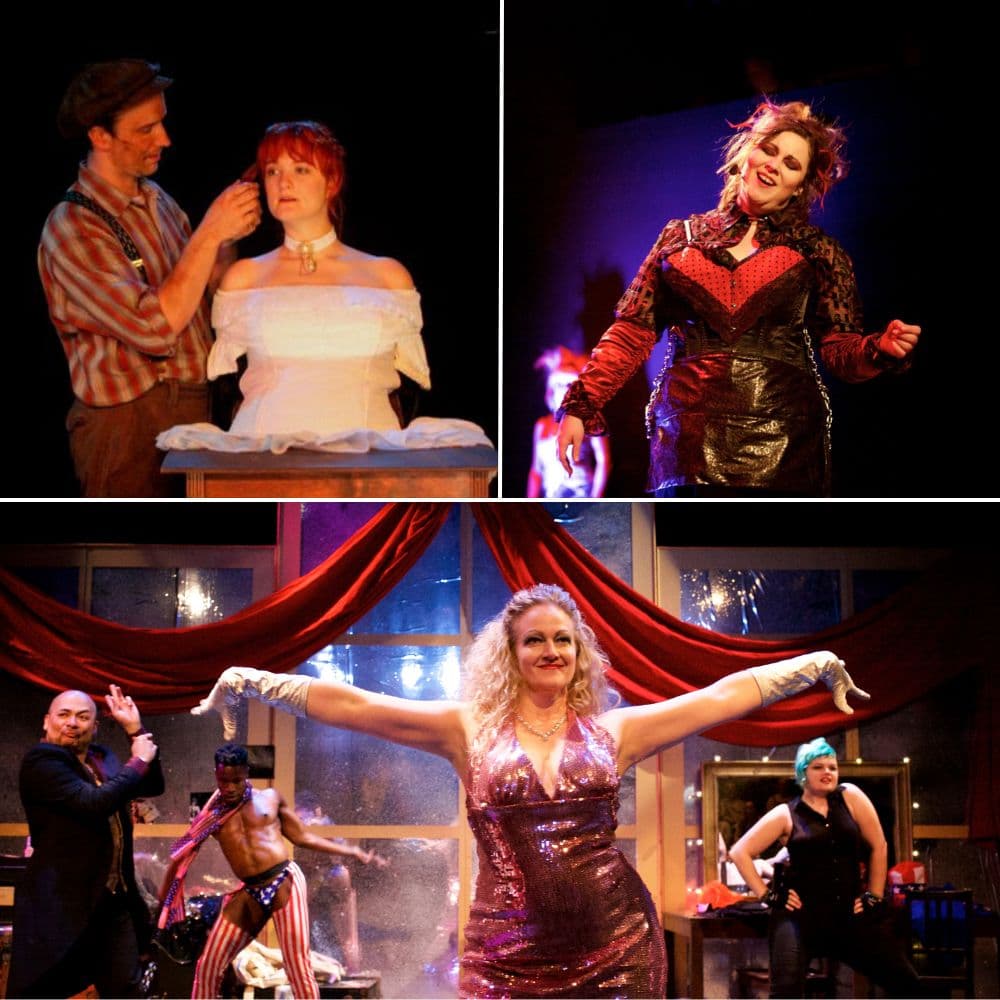Some theaters are built on a wing and a prayer. Pinky Swear Productions was built on a wink and a swear. A pinky swear — you remember that indelible promise made on an elementary school playground when recess ruled the day. Two friends — or foes — make a promise and swear it by hooking and shaking their pinky fingers.
Karen Lange, one of the instigators and founders of Pinky Swear and its longtime artistic director, recalled the feminist theater’s origin story:
“There were a bunch of [women] in an acting class at the old Studio Theatre Acting Conservatory. One of our friends was in a show at Fringe. We went to see her. The show was terrible, mostly terrible because it had a bunch of women in it, and all of the women’s roles were stupid. By stupid, I mean that the guy wrote it as his ‘wet dream’: all the women were attractive and he was played by a shlumpy guy — one critic called him ‘a poor man’s Paul Giamatti.’”

“Our friend played a lesbian who wore an eye patch and carried a knife. We weren’t sure why, but basically, she was so attracted to this shlumpy guy, she ‘switched teams.’ It was a ridiculous character. We stood outside the theater and said somebody should do a show with good roles for women.
“We promised we’d find a way to make this happen,” Lange said. “So we pinky swore -— it was either that or slash our hands and swear with blood.”
The following year, Freakshow by Carson Kreitzer, directed by Lise Bruneau, became Pinky Swear’s premier production at the 2009 Capital Fringe Festival. Since then, Lange and a rotating cast of collaborators and performers have produced 18 shows, some drawn from new script research, others created, written, and composed by Pinky Swear teams from a roster of dozens of artists. And while Pinky Swear’s raison d’etre was to produce plays with meaty and desirable roles for women, over the years the casts, playwrights, directors, and collaborators are not always and need not be exclusively female.

The first production to put the woman-centric company on the map — Cabaret XXX: Les Femmes Fatales in 2011 — received a Best Musical prize at Capital Fringe and became the impetus for additional risqué, quirky, feminist cabarets in subsequent years.
Amplifying Women’s Voices On Stage and Off
“We’re about women being badasses,” Lange stated, without apology. “Cabaret XXX was a rock and roll show, then we did four more of them.” Since its early days, the group has waxed and waned, at its peak having an estimated 16 active contributing artists on its roster and an associate artist program where developing theater artists would work with the company for a year in an apprentice-like position, helping with creative ideas and administrative work, while learning how a small theater company gets things done.
“But over time,” Lange shared, “people age, stuff happens, actors need to focus on their [day] job, or they decide theater isn’t what they want to spend their time on anymore. It’s too much.” These days, Pinky Swear runs under the single leadership model, with Lange as artistic director, instigator, and impetus for new productions, including the recent 2023 Capital Fringe entry Bell Wringer, a musical reimagining of an Appalachian Bell Witch legend, co-written by Lange and Seth Alcorn.

For many years Lange noted a dearth of women artistic directors and artistic staff at large regional theater companies across the DMV as well as at smaller independent troupes like hers. She pointed to the 2015 Women’s Voices Theater Festival initiated by big gun theaters Arena, Shakespeare, Signature, Woolly Mammoth, Ford’s, Round House, and Studio. While 50 productions by female-identifying playwrights trod the boards, Lange noted that because of a lack of solicited input from smaller theaters and the requirement that each participating organization present a world premiere, the results were less than ideal. “Women’s voices were not necessarily amplified from the ground up,” she asserted, adding, “Good things have happened since. There has been a lot of change in recent years and there are more women artistic directors in town, quite a few. There’s more diversity, too. I feel this when I’m producing a show. Sometimes theaters feel like if they don’t include every issue in every single show, they’re somehow [not doing the right thing].”
Lange continues to keep her eye on new work and new collaborators, while also returning to those fruitful connections from Pinky Swear’s past. Early on, Lange and her colleagues sought script ideas the old-fashioned way: reading published new-play anthologies. “We read and read and read and read — this was before the National New Play Network existed — [until] we would find something that resonated.” Finding nontraditional performance spaces often became another signature of Pinky Swear, from the Capital Fringe Festival tents, to one-acts in a tiny house community, to the concrete bunker-like Dupont Underground, a former streetcar station.
These days, Lange has her hopes set on bringing one of Pinky Swear’s plays to the mother of all Fringe Festivals, Edinburgh’s in Scotland. She took a scouting trip in August 2023 to assess the possibility.
What Makes a Pinky Swear Play?
Lange considers thoughtfully what makes a play appropriate for Pinky Swear. “There’s a certain amount of humor in it — sardonic, wry humor. We don’t do clowning and slapstick, but we do a lot of usually hyperverbal dialogue. I don’t love plays that are all monologues. If it has a monologue, I’d prefer it to be a song.”
Foremost, though, Lange continues, “It should have interesting women characters. And by interesting, I mean they have lives, they have some experience. We don’t do a lot of shows about really young folks. I feel that I am more interested in people who are older and have more experience in life. I like to see more perspective, so [characters who are] a little bit older, a little sarcastic, a little wry or sassy. Sometimes they might be quite profane. We swear a lot in shows. [A Pinky Swear play] needs to have good conversations and action between people who have lives and thoughts and experiences and more than just a job, more than just a role in a family just more.”
Upcoming plans are vague right now, with the exception of what Lange called a “silly Christmas show” at Crazy Aunt Helen’s, a restaurant on Barracks Row in Washington, DC.
A Future in Pink
Running a small, independent theater on a shoestring budget has never been easy. The pandemic closures made it even harder. But Pinky Swear came back. “One of the only reasons I haven’t completely packed it in is that I do like having a voice and the ability to choose what I want to do. I like the ability to offer what I consider quality work to people,” Lange said, admitting, “It’s not hugely well-paid work, but I tend to pay a little bit better than a lot of other [theaters]. I recently instituted a flat pay scale: Everybody makes the same amount of money, no matter what you do.
“Even though theater is tough right now,” she continued, “I hope people continue to take the risk. If a hundred people see your show and it’s something you can afford to do, that’s a hundred people you have reached with some art that will stay with them. That’s a hundred people who have had an experience that is unique every night.”
Lange added, “There are all these articles about how theater is dying — there’s too much theater. My response: Just keep taking the risk. Just put yourself out there, figure out how to do it with little to no money and add something to the world. Make some art.”
To keep up with Pinky Swear Productions, visit pinkyswear-productions.com/.
About the Wendi Winters Memorial Series: DC Theater Arts has partnered with the Wendi Winters Memorial Foundation to honor the life and work of Wendi Winters, the DC Theater Arts writer who died in the Capital Gazette shooting in Annapolis, Maryland, on June 28, 2018. To honor Wendi’s legacy, the Wendi Winters Memorial Foundation has funded the Wendi Winters Memorial Series, monthly articles to be produced by DC Theater Arts to bring attention to theater companies and theater practitioners in our region who engage in exemplary work that makes our community a better place. The centerpiece of these articles is a series we are calling “The Companies We Keep,” articles offering an in-depth look at one local theater company each month. In these times of division and conflict, DC Theater Arts chooses to celebrate those who do good.
For more information on DC Theater Arts’ Wendi Winters Memorial Series, check out this article graciously published by our friends at District Fray Magazine.
SEE ALSO: DCTA’s coverage of Pinky Swear Productions over the years.





